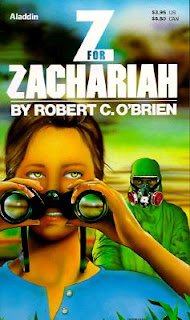Monday Musings: Faeries and Cleverness: A Review of The Chestnut King
I finished the third book in N.D. Wilson's 100 Cupboards trilogy much faster than the second. Given how much I wound up enjoying Dandelion Fire, that should give you an idea of what I think of The Chestnut King.
Picking up a few months after the end of Dandelion Fire, The Chestnut King begins with Henry once again caught between two worlds, sneaking back to Kansas through the cupboards to spend time with Zeke. Of course, he's not nearly as sneaky as he thinks he is, but his family knows he needs time to figure out where he fits in the worlds. Henry's father, Mordecai, who returned at the end of Fire, has been searching for a way to defeat Nimiane and teaching Henry how to control the magic that sprouts within him. Nimiane's rise to power continues in leaps and bounds, precipitating Mordecai's journey to her home kingdom of Endor. Just before he leaves on this mission, Mordecai tells Henry that the situation is more desperate than anyone realized; Nimiane's blood, which scarred Henry at the end of The 100 Cupboards, is spreading and will eventually sap the life and magic from Henry's body, making him at best another victim of the witch-queen's rampage, and at worst her slave.
No sooner has Mordecai set out than the distant Emperor's soldiers conquer the town of Hylfing and kidnap Henry's family. Only Henry, Henrietta, and grandmother Anastasia escape through Henry's cupboard door into Kansas. From there, they must ally with Zeke and attempt to rescue their family members and find the secret to Nimiane's defeat.
In this exciting conclusion to the 100 Cupboards series, Wilson offers a logical finale that follows up on the themes and ideas of the previous two books. The climax is properly intuitive and intensely satisfying, with the final cleverness on the part of Henry benefiting from some subtle foreshadowing on Wilson's part (something the finale of Dandelion Fire suffers from a lack of). Henrietta and Henry continue to balance one another out, and their antagonistic friendship remains one of the highlights of the series. This time, however, they have both grown from their previous experiences, and Henry is the more active (even if he is reluctant about it) while Henrietta is more cautious after all the trouble she landed herself in during Dandelion Fire. Similarly, Mordecai's character is deepened so that he is a vastly human father doing his best to care for his family and to restore some of what they have lost in the time he was away. His failure to succeed where Henry later wins the day is a necessary moment in the story that feels more natural in Wilson's prose than in many similar stories.
While The Chestnut King hits on some fantasy tropes, it tends to spin them in new ways or add a human element to make them feel fresh and real. (This human characterization is something Wilson excels at, and Uncle Frank is a prime example of his ability to create a character who is both consistent and surprising.) The best trope spinning in the book comes with Henry's handling of the succession of kingship at the end of the book. Wilson sets up the twist perfectly while still leading you to expect the usual resolution to this plot thread.
I only have two (somewhat minor) quibbles with the book. The first is that the FitzFaeren seem to have vanished from the story without a moment's notice. They were on the decline in Dandelion Fire, but there was some hope of their survival, and no one seems to remember them in this book because we're far too concerned with the proper Faeries. The second is that while there are women who are willing and able to fight in this book, they are all given "only a knife" when it comes time to fight, and none of them seem to have the training the men have received. While the lack of women fighting isn't necessarily a bad thing, the repetition of "only a knife" every time there is fighting to be done made the situation more noticeable in a negative way.
Overall, this is a fine conclusion to an entertaining series. If you enjoyed either of the first two books, you should pick this one up.




Comments
Post a Comment
What do you think?